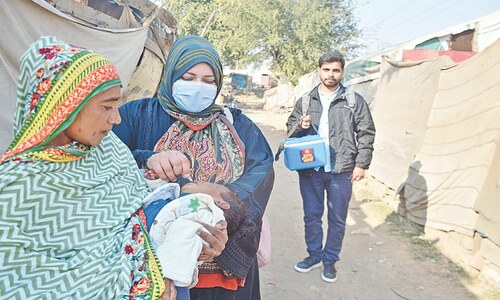ISLAMABAD, Jan 26: An official in charge of strategic weapons gave an unprecedented presentation to foreign media in Islamabad on Saturday to allay fears that nuclear weapons could fall into the hands of terrorists.
The briefing by retired Lt-Gen Khalid Kidwai, director-general of the Strategic Planning Division (SPD), came hard on the heels of assertions by President Pervez Musharraf in Europe that such scenarios were impossible.
“We have instituted command and control structures and security measures in a manner so as to make these foolproof,” said Kidwai, who retired from the army in October but not from his position heading the SPD.
“We are capable of thwarting all types of threats whether these are insider, outsider, or a combination.”
He said 10,000 troops were deployed around Pakistan’s nuclear facilities.
Kidwai said security was heightened after militants began more actively targeting the military in a wave of suicide attacks during the past year.
“The state of alertness has gone up,” Kidwai said in a briefing at the SPD Secretariat in Rawalpindi.
However, no conspiracy or plot related to nuclear facilities had ever been uncovered, he said, though in years gone by Al Qaeda had shown an interest in acquiring a nuclear weapon.
Kidwai, who has headed the SPD since its inception in 1999, has given three similar presentations to foreign diplomats and Pakistani media during the past few months in response to anxiety that instability in the country raised the risk of militants getting hold of nuclear weapons or material for a “dirty bomb”.
Kidwai said there was an exhaustive vetting process, involving political, moral and financial checks and psychological testing for staff working in nuclear facilities, and security monitors kept especially close tabs on some 2,000 scientists working in ultra-sensitive areas.
“There is no conceivable scenario, political or violent, in which Pakistan will fall to the extremists of the Al Qaeda or Taliban type,” Kidwai said.
“The fears are based on a lack of objective understanding of Pakistan’s ground situation and lack of information.”
Kidwai said Pakistan had adopted a command and control system based on international guidelines and those of the UN watchdog International Atomic Energy Agency.
“This strikes a good balance between physical security, operational readiness and firewalls that will prevent accidents, unauthorised use and even thefts.” He said it would take many experienced hands to put to use a nuclear weapon if it fell in the wrong hands.
“We feel very confident that our command, control and security system is well established, is effective and responsive.”
He said the nuclear proliferation scandal that broke in 2003, revolving around Abdul Qadeer Khan, a scientist regarded as the father of country’s nuclear bomb, was a closed chapter and there was no evidence to suggest any members of the military establishment had been involved.
He said Khan’s activities largely pre-dated the establishment of the SPD, and subsequent breaches of security by people involved in the nuclear programme had been minor, citing the case of a scientist who made an anti-Musharraf speech in a mosque and was removed the next day.—Agencies













































Dear visitor, the comments section is undergoing an overhaul and will return soon.